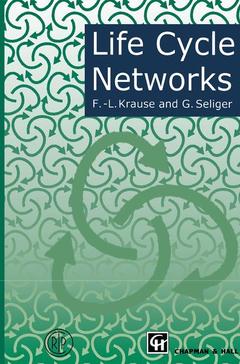Life Cycle Networks, Softcover reprint of the original 1st ed. 1997 Proceedings of the 4th CIRP International Seminar on Life Cycle Engineering 26–27 June 1997, Berlin, Germany
Langue : Anglais
Auteurs : Krause Frank-Louthar, Seliger G.

The globalisation of markets and the expansion of product responsibility into the entire product life cycle lead to an increasing competitive situation for nationally and internationally operating companies. Therefore, to win this competition the use of the most effective and efficient resources regarding the whole product life cycle is necessary. Since these resources are globally distributed the different tasks both within a phase of product life cycle and those spread over different phases are distributed as well. The global interference of these tasks requires a close multilateral co-operation of the companies concerned. Current information- and communication technologies and modern management concepts offer high potentials to meet these requirements. The international seminar of CIRP on Life Cycle Engineering titled "Life Cycle Networks" was a forum for the presentation and discussion of current research work and recent advancements on these strategic issues for current and future engineering. Complex requirements and innovative solutions to support and realise Life Cycle Networks has been revealed and summerised. The employment of information technology to support both specific phases of product life cycle and holistic approaches will be the main focus. This volume contains the papers presented at the seminar which provide opportunities to identify the state-of-the-art and address future needs. The parts in this volume correspond to the sessions of the seminar and are presented under the following headings: Life Cycle Management; Life Cycle Design; Design for Environment; Design for Recycling; Life Cycle Assessment; Disassembly; IT-Networks.
One Life Cycle Management.- 1 More use with fewer resources - a contribution towards sustainable development.- 2 Application of PDM technology for product life cycle management.- 3 Life cycle management at Brødrene Hartmann A/S - strategy, -organisation and implementation.- 4 Logistic strategies for the realization of a life cycle economy.- Two Life Cycle Design.- 5 Product life cycle design based on deterioration simulation.- 6 Sustainable life-cycle engineering - a challenge for design science.- 7 Product life cycle modelling by design working spaces and planning spaces.- 8 A holistic approach to life cycle design.- Three Design for Environment.- 9 euroMat’97 - tool for environmental life cycle design and life cycle costing.- 10 Organisational requirements for achieving environmentally conscious design.- 11 Eco-potential as a tool for design for environment.- 12 COMMET - design of environment-friendly products by using practical examples.- 13 Product development - integration of environmental aspects.- 14 The eco-effective product design - the systematic inclusion of environmental aspects in defining requirements.- 15 Design for environment - computer based product and process development.- 16 Environmental aspects of sheet metal forming.- Four Design for Recycling.- 17 Methodical scope for design processes for recycling and maintenance.- 18 Re-design of electromechanical products for re-use and recycling.- 19 Model guided recycling oriented product design.- 20 Design for disassembly and recycling.- Five Life Cycle Assessment.- 21 Determination and evaluation of the optimal end of life strategy for products based on simulation of disassembly and recycling.- 22 Environment-oriented assessments for the life-cycle engineering.- 23 Benefit function for determining the optimum recycling option for products and parts.- 24 NORDLIST LCA lifecycle assessment in product development.- 25 Comparison of simplified environmental assessments versus full life cycle assessment (LCA) for the elctronics designer.- 26 Selecting green design strategies on the basis of eco-efficiency calculations.- 27 Decision management systems for downcycling/upcycling/eco design-interdisciplinary experiences.- 28 Innovations for environment and recycling based on the common development of the automotive industry and their suppliers.- Six Disassembly.- 29 Application of feature technology in a disassembly-oriented information technology infrastructure.- 30 Total disassembleability - a function of product design and disassembly system design.- 31 Assessment of future developments in automated disassembly and the influence on end-of-life scenarios.- 32 Implementation and testing of a reactive disassembly planner.- 33 Computer-aided disassembly planning as a support to product redesign.- 34 A disassembly information system.- 35 Disassembly structures - an approach to understand product structures from a separation viewpoint.- 36 Planning and re-planning strategy of disassembly processes.- Seven IT-Networks.- 37 Cooperative product data modelling in life cycle networks.- 38 IDEE© - information network for closed loop economy.- 39 The green browser: an internet-based information sharing tool for product life cycle design.- 40 Web based tools in support of life cycle engineering.- Index of contributors.- Keyword index.
Date de parution : 10-2012
Ouvrage de 482 p.
15.5x23.5 cm
Disponible chez l'éditeur (délai d'approvisionnement : 15 jours).
Prix indicatif 210,99 €
Ajouter au panier
© 2024 LAVOISIER S.A.S.



